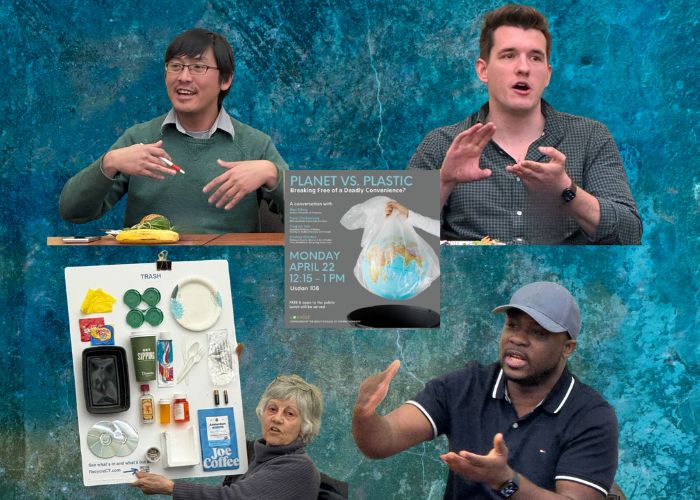
On a significant day for environmental awareness—Earth Day, April 22—I found myself seated in Usdan 108, engrossed in a compelling panel entitled, “Planet vs. Plastic: Breaking Free of a Deadly Convenience?” The event, hosted by the Bailey College of Environment, featured a panel of Wesleyan faculty and community members dedicated to unraveling the complexities of plastic pollution and its ramifications on our planet. As I reflect on the insights shared during the event, I realize the urgency of addressing this global crisis and the imperative need for collective action.
The panel, comprised of faculty and members of the Wesleyan community from diverse academic backgrounds, including Professor Emerita Krishna Winston; Ying Jia Tan, associate professor of history and a member of the Bailey COE Think Tank; Ben Elling, assistant professor of chemistry; and PhD candidate Fatai Olabemiwo, underscored the criticality of eliminating plastics, particularly microplastics, for the betterment of both the environment and human health. Their interdisciplinary approach shed light on the multifaceted nature of the issue, delving into aspects of community engagement, sociology, environmental science, biochemistry, and economics.
The conversation commenced with the panelists elucidating their motivations for delving into the realm of plastic pollution. Fatai Olabemiwo’s journey, ignited by a CNN news segment highlighting the pervasive presence of microplastics, resonated with me profoundly. His realization of the omnipresence of plastic in our daily lives struck a chord, prompting me to reevaluate my plastic consumption habits. Indeed, as I sat there with a plastic coffee cup in hand, I couldn’t help but acknowledge the insidious infiltration of plastic into every facet of our existence.
Plastic, while undeniably convenient, paradoxically poses a grave threat to our ecosystem. The panelists illuminated the alarming reality of microplastics permeating our food chain, infiltrating plants, and ultimately finding their way into our bodies. Despite efforts to recycle plastic, the limitations and inefficiencies of current recycling practices became glaringly apparent. Professor Emerita Krishna Winston highlighted the pivotal role of educational awareness and legislative measures, such as the single-use plastic ban implemented in Middletown, Connecticut, as pivotal steps towards combating plastic pollution.
Moreover, the discussion delved into emerging research avenues, including chemical recycling, as a potential solution to mitigate plastic pollution. However, the panelists cautioned against overly optimistic projections, citing the nascent stage of such technologies and their limited efficacy in addressing the magnitude of the problem.
Ultimately, the “Planet vs. Plastic” event catalyzed heightened awareness and engagement. The interdisciplinary dialogue fostered a nuanced understanding of the plastic predicament, transcending disciplinary boundaries and prompting introspection on individual consumption patterns. As I departed the event, I felt empowered to embark on a journey towards reducing my plastic footprint and advocating for systemic change.
Overall, the battle against plastic pollution demands concerted efforts and unwavering commitment from individuals, communities, and policymakers alike. Events like “Planet vs. Plastic” epitomize the power of collective action and education in catalyzing meaningful change. It is imperative that we heed the call to action, for the stakes are too high to ignore. Let us harness our collective resolve to break free from the shackles of plastic convenience and pave the way toward a sustainable future for generations to come.




